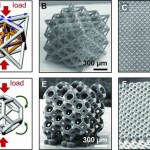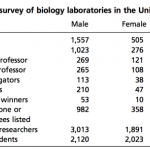Science
In which our hangout turns nineteen; we may need to look into a special guest for the 20th, or something. Or maybe save guest stars for the one after that, when it can drink.
Anyway, Rhett and I chat about grading, lab reports, why Excel sucks, and an online experiment that we really ought to do if we only had the time.
Some links:
-- Why Does Excel Suck So Much?, and "Line Plot" is Never the Right Choice. Perennial favorites on the blog.
-- How Do I Kill the Squirrels Who Are Eating My Car?, another constant source of a small amount of traffic.
-- Rhett's elevator video post.
-- My soccer…
New genetic disorders pop up all the time -- each one represents a child who may face incredible challenges, or even be doomed to death. A child named Bertrand exhibited some serious symptoms -- profound developmental disabilities -- shortly after he was born, and no one could figure out what was wrong with him. So they took advantage of 21st century biotechnology and sequenced his genome, and the genome of both of his parents, and asked what novel mutations the child carried.
For years, sequencing was too expensive for common use—in 2001, the cost of sequencing a single human genome was…
One of the things climate change science deniers say, to throw you off, is that Antarctic sea ice is expanding. They even claim that the amount of expansion of Antarctic sea ice offsets the dramatic retreat of Arctic sea ice (see this for the latest on the Arctic). I've even seen it argued, in that famous peer-reviewed publication Twitter, that there is an inter-polar teleconnection that guarnatees that when the ice on one end of the earth expands the ice on the other end of the earth contracts, and visa versa, so everything is fine.
That Antarctic Sea ice is expanding has become standard…
As noted last week, I went to SteelyKid's day camp on Tuesday to talk about being a college professor. This was a little awkward, because I was scheduled to talk to kids ranging from not-quite-three to six-and-a-bit, and really, what do they care about the daily routine of physics faculty?
So, I did a simple demo. While I got a lot of really interesting suggestions in the comments to last week's post, most of them required more props than I wanted to drag with me. And for that age, simple is often enough. So, I just did the tennis-ball-on-a-soccer-ball trick. For the benefit of readers who…
Astrophotography is the title of a gorgeous and very useful new book by Thierry Legault
I had to taper off doing book reviews, much to the annoyance of all those lovely people who persist in sending me just the sort of books that I actually really love to read - it just got too time consuming - but, when Rocky Nook told me Thierry Legault had a book on Astrophotgraphy coming out, I agreed to review it immediately.
This is why:
shades of Atlantis
Atlantis
From NASA HQ Photo on Flickr
Thierry Legault is an expert and he takes beautiful photos. He is particularly known for his patient set up…
The surest sign that I've become a Real Author is that there are five months yet before Eureka comes out, and I'm already fretting about negative reviews. Negative reviews that haven't happened yet, but that I know will come, in a particular form.
The book, as you probably know from my prior ramblings on this subject, contains a large-ish number of historical anecdotes illustrating particular aspects of the scientific process, and relating them to everyday activities (rough list in this post). The thing that I worry about is that I decided early on to make a conscious effort to keep the whole…
One of the most common criticisms launched at defenders of science-based medicine by believers in pseudoscience and quackery is that we are “pharma shills.” The assumption, or so it would seem, is that no one would defend science, reason, and medicine unless he were paid off by pharmaceutical, chemical, and/or agricultural companies. The further assumption is that, in contrast to our greedy grasping selves, they are not motivated by such base concerns as money. That is their self-image, that of pure-hearted warriors against evil, the evil being big pharma, big agriculture, big chemical,…
We got an email from the people running SteelyKid's summer camp asking for volunteers to speak at a career day sort of event early next week. I said "Sure, I can do that, and talk about the glamorous life of a physics professor and book author." They said "Great, you'll be talking to several groups, ranging from second-graders down to 3-4 year olds."
That's... not quite the audience I was expecting (the camp runs up through 5th grade or so). I don't think they're going to care all that much about physics research, so instead, I'll probably say "My job is to teach people about science" and…
A research group at Lawrence Livermore National Laboratory has produced ultrastiff ultralowdensity metamaterials by 3D printing of microarchitected microlattices.
This is very cool - they do additive 3D printing using microstereolithography with nanocoating and postprocessing and can make self-similar lattices with densities varying by several orders of magnitude in bulk density but near constant stiffness.
Construction material can be metal, ceramic or polymer.
LLNL engineered microlattices from Zheng et al Science 344 1373
The lattice geometry can be controlled to choose what mechanical…
Three months ago, I wrote about how the Cleveland Clinic had recently opened a clinic that dispensed herbal medicine according to traditional Chinese medicine (TCM) practice. As regular readers might expect, I was not particularly impressed or approving of this particular bit of infiltration of quackademic medicine into a major, generally well-respected academic medical center, particularly given some of the amazingly pseudoscientific treatments espoused by the naturopath who was running the clinic. I also pointed out that, although herbalism is the most plausible (or perhaps I should say the…
We're always talking about this curious phenomenon, that we see lots of women at the undergraduate and graduate level in biology, but large numbers of them leave science rather than rising through the ranks. Why is that? It seems that one answer is that elite male faculty in the life sciences employ fewer women, that is, the more prestigious, well-known labs headed by male faculty with great academic reputations tend not to hire women for the next level of training.
Women make up over one-half of all doctoral recipients in biology- related fields but are vastly underrepresented at the faculty…
Over the years I’ve been studying science versus pseudoscience, medicine vs. quackery, reason versus crankery, I’ve noticed one thing. The cranks, pseudoscientists, and quacks of the world have a hard time dealing with legitimate criticism. Now, I know I sometimes get a bit—shall we say?—frisky with my criticisms. OK, obnoxious. I have, however, mellowed considerably since the dawn of this blog, as any reading of posts from the early days (or even not-so-early days) will confirm. Sure, I do occasionally still reach back into that reservoir of the “Insolence” that got me started, but I’d never…
The EU is sinking €1.2bn (and the US is proposing to spend more, $3 billion) into a colossal project to build a supercomputer simulation of the human brain. To which I say, "What the hell? We aren't even close to building such a thing for a fruit fly brain, and you want to do that for an even more massive and poorly mapped structure? Madness!" It turns out that I'm not the only one thinking this way: European scientists are exasperated with the project.
"The main apparent goal of building the capacity to construct a larger-scale simulation of the human brain is radically premature," Peter…
I've been following the story of stimulus-triggered acquisition of pluripotency (STAP) cells with considerable interest, and there's a good reason for that: from the very beginning, it contradicted how I'd always thought about cell states, and if it were true, I'd have to rethink a lot of things, which was vexing. But on the other hand, empirical results always trump mental models, so if the results held up, there was no question but that I'd have to go through that uncomfortable process of reorganizing my preconceptions. It would be OK, though, because there'd be a great prize at the end.…
Also coming to my attention during the weekend blog shutdown was this Princeton Alumni Weekly piece on the rhetoric of crisis in the humanities. Like several other authors before him, Gideon Rosen points out that there's little numerical evidence of a real "crisis," and that most of the cries of alarm you hear from academics these days have near-perfect matches in prior generations. The humanities have always been in crisis.
This wouldn't be worth mentioning, but Rosen goes on to offer an attempt at an explanation of why the sense of crisis is so palpable within the humanities, an explanation…
Right around the time I shut things down for the long holiday weekend, the Washington Post ran this Joel Achenbach piece on mistakes in science. Achenbach's article was prompted in part by the ongoing discussion of the significance (or lack thereof) of the BICEP2 results, which included probably the most re-shared pieces of last week in the physics blogosphere, a pair of interviews with a BICEP2 researcher and a prominent skeptic. This, in turn, led to a lot of very predictable criticism of the BICEP2 team for over-hyping their results, and a bunch of social-media handwringing about how the…
I didn't plan to do a follow-up to yesterday's post about the optics of sending messages with lasers, but then I starting idly thinking about detection, prompted in part by a bunch of conversations with my summer students about single-photon detectors. which led to scribbling on the back of an envelope, which led to Googling, and suddenly, I have a follow-up post.
So: as we said yesterday, if you want to send messages over a distance of ten light years, a relatively efficient way to do this might be to send them via lasers. This results in the light being spread over a pretty big area, though…
In the comments to yesterday's grumpy post about the Fermi paradox, makeinu raises the idea that advanced aliens would be using more targeted communications than we do:
On the point about electromagnetic communications: even we are now using lasers to target communications with space, because it’s simply more efficient and reliable.
It’s also basically impossible to intercept, since you literally have to interrupt the beam to do so.
This is true, to a point, but when you're talking about interstellar distances, it's not quite true that you have to interrupt the beam to detect communications…
I've seen a bunch of people linking approvingly to this piece about the "Fermi paradox," (the question of why we haven't seen any evidence of other advanced civilizations) and I can't quite understand why. The author expends a good deal of snark taking astronomers and physicists to task for constructing elaborate solutions to Fermi paradox on the basis of shoddy and unjustified assumptions. And then proceeds to offer a different solution for the Fermi paradox based on shoddy and unjustified assumptions. Whee!
I mean, there is an element of this that's useful, namely the reminder that "We…
The physics vs. philosophy slow-motion blogfight continues, the latest major contribution being Sean Carroll's "Physicists Should Stop Saying silly Things About Philosophy. I've been mostly trying to stay out of this, but when I read through the comments at Sean's post to see if anybody offered any specific examples of problems that could've been avoided by talking to philosophers, I was kind of surprised to find a lot of people talking up Niels Bohr. (Likewise Ashutosh Jogalekar's Philosophy Begins Where Physics Ends....) If you're trying to talk up the virtues of philosophy over "pure"…







